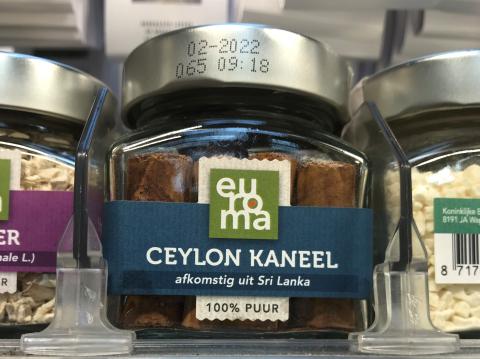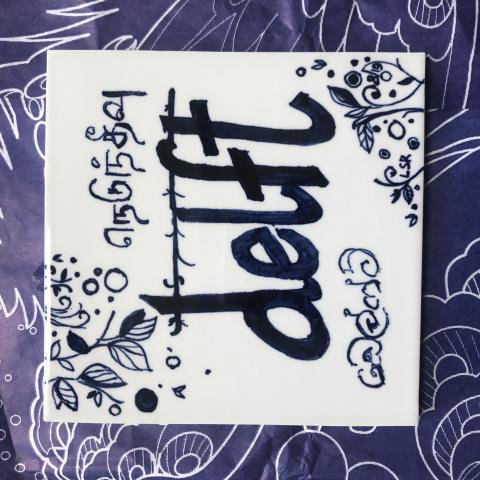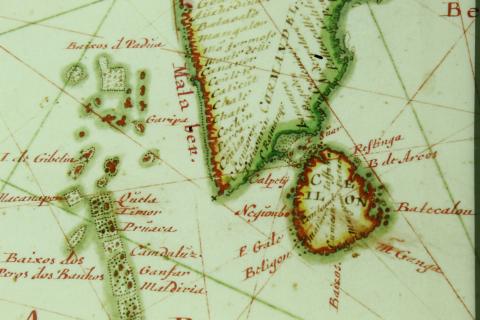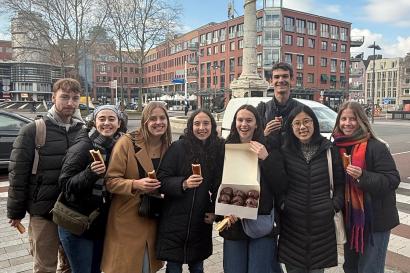The white man selling paintings beside the Westerkerk smiles as I approach. “Where are you from?” he asks me.
Later I will learn that for some Dutch citizens with immigrant parents or grandparents, this question - waar kom je vandaan? - can have volatile undertones, much like the “Where are you really from?” posed to people in the U.S. For now, I just say, “I’m from Sri Lanka.”
“Oh, Sri Lanka!” exclaims the man. “I was there once!”
After two years living in the American Midwest, where eight out of ten Uber drivers will tell me they didn’t know Sri Lanka was a country, this instant recognition stuns me. The man continues. “I was in Colombo, Negombo, Unawatuna - ” He lists city names I hadn’t expected to hear for months. “That was in 1995,” he says finally. “I was about your age!”
“It was a different time,” I say circumspectly. I ask for his name - it is Hans - and if I can take his picture. Then I set off back to my group. As I walk away, Hans calls, “Enjoy your stay in Amsterdam!”
A little context for this encounter: over three hundred and fifty years ago, my country was a Dutch colony. Now, in 2019, I’m in the Dutch capital city, studying at a university established a few decades after the first Dutch ships reached Sri Lanka. I have the capacity to ask a Dutch man for his picture and then walk away.
A lot has changed.
There’s no doubt that each individual from a former colony will confront this part of their history differently. In Sri Lanka, remnants of it are strewn through daily life - Portuguese architecture, Dutch churches, British curriculums. In a nod to British influence, I am more fluent in English than I am in my mother tongue Sinhala, which itself hosts many Dutch loanwords - arthapel (aardappel), kamaraya (kamer), vatura (water). But I’ve felt the reverberations of colonialism differently since arriving in Amsterdam. My country follows me in ways it never can in my Illinois college town. I order black tea at Pancakes Westermarkt and it arrives in a tea bag from a Sri Lankan company, Dilmah. In the spice aisle at Jumbo, I’m confronted by a jar labeled Ceylon Kaneel: Ceylon Cinnamon.

Sometimes the reverberations take a while to reach me. In August, I travel to Delft with IES Abroad. The city is old and quiet, and I am at ease in its narrow streets. It isn’t until I’m at the Royal Delft Blue pottery factory, about to paint my own tile, that I remember the other Delft. An island off the northwest coast of Sri Lanka, eight kilometers long, the last stop before India. Once, the Dutch were there too, and despite the island having its own Tamil name - Neduntheevu - the colonial name still appears on maps today. Delft, in reference to the city that was once a port for the East India Trading Company. I shun the images of canal houses and ink Sinhala and Tamil script onto my tile, suddenly determined to bring Neduntheevu into the elite industry of this place, however superficially.

In the month after that, I look for my country. In the Amsterdam Museum, I descend into the belly of the World-City exhibition and find old maps of the Netherlands - and its former colonies - glowing under glass. On a map of Asia from 1650 is Ceilon, studded with names that I’ve known all my life, now made strange, Batticoloa morphing into Batecalou. In the Rijksmuseum, I find one sentence on the walls of Gallery 1.5: “On Ceylon (Sri Lanka), the VOC concentrated on the cinnamon trade.” In the Tropenmuseum, I am terrified of rounding a corner and seeing Sri Lanka represented in the same simplistic, guilty manner as Suriname and Indonesia. Finding no real mention of it, I am relieved that my country is safe from the western gaze; paradoxically, I wonder why over 130 years of occupation have disappeared.
The narrative around colonialism and empire is very different in the Netherlands than it is in former colonies. For many countries around the world, the 17th century was known as a period of Dutch and European conquest, enslavement and violence, but in the Netherlands it is known as the Golden Age. The average Dutch citizen might never have known of colonialism’s violations and today’s Dutch school children are not adequately educated about colonialism. During conversations I had with Dutch students in the U.S., the topic was guaranteed to cause awkwardness.
It’s telling that a 17th-century painting of Amsterdam’s wealthiest houses, entitled “View of the Golden Bend in the Herengracht,” is accompanied by a Rijksmuseum statement including the sentence, “Some of the residents earned their money from trade in Asia, and almost every interior boasted Asian luxury goods." Always trade: never conquest.
Some of you might wonder why these distinctions and histories still matter to me. After all, my country’s relationship with the Dutch is not as current as that of say, Indonesia, which only won independence in 1945, or Sint Maarten, which is still a Dutch territory. For Sri Lanka, the most recent colonial association is with the British, from whom we won independence in 1948. Others might wonder what I hope to accomplish with this exploration. After all, countries like mine have already suffered the repercussions of Western attention: it should be time to strike out alone. Still, others might say that my act of learning to speak Dutch, acquiring the education required to create change back home, and above all, enjoying my stay in Amsterdam, is reconciliation enough. The empire has taken back. But this past month has convinced me there’s more to it. However long ago it happened, whatever the balance between ‘development’ and conquest, I think there has to be greater acknowledgment of the facts of the last few centuries. Not the status of my country and others as “former colonies,” but the Netherland's role as a former colonizer.
Not trade, but colonialism.


Shanela Ranaraja
<p>My name is Lalini Shanela Ranaraja. I grew up in Sri Lanka, a tropical island-nation blessed with perpetual summer, and yet I ended up going to college nine thousand miles away, in Rock Island, Illinois! I’m studying anthropology, journalism and creative writing because I couldn’t pick just one. In my spare time, I dabble in languages (I speak four), browse art supply stores, and people-watch. I require at least one long, rambling walk a day, even if there’s eight inches of snow on the ground.</p>







